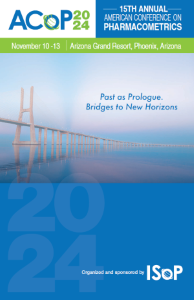Other
(T-138) Modeling Patient Risk Factors and their Role in Dose Optimization for Oncological Trials
Tuesday, November 12, 2024
7:00 AM - 5:00 PM MST
Justin Zhao, NA – Undergraduate Student, University of Duke; Yanguang Cao, NA – Associate Professor, University of North Carolina at Chapel Hill
- SZ
Sihong Zhang, n/a
Postdoc
University of North Carolina at Chapel Hill, United States
Author(s)
Objectives: The first objective of our study is to investigate how prevalent oncological trials are randomized based on factors with limited prognostic values. Next, we assess how treatment effect estimation is affected by using prognostic score (PS, a collective integration of prognostic factors) as a singular randomization factor in dose optimization trials.
Methods: We employed modeling and simulation techniques, utilizing a well-established prognostic model (Real wOrld PROgnostic score, ROPRO) to conduct virtual clinical trials and evaluated the impact of randomization on PS on trial efficiency in dose optimization. Specifically, forty patients-virtual trials randomized on PS (psRCT) into two arms, with each received dose for comparison.
Results: Regarding the first objective, we included 101 randomized clinical trials (RCTs) in our analysis. There were 55 RCTs in non-small cell lung cancer. Interestingly, we found that 2 out of the top 3 collected randomization factors in these trials are not among the top 5 most prognostic factors identified in the prognostic models. Similarly, in 23 RCTs in metastatic breast cancer, 2 out of the top 3 collected randomization factors are not among the top 5 most prognostic factors. Concerning the second objective, compared to the trials without randomization on PS, psRCT trials exhibited much higher efficiency in selecting the optimal doses and generating faithful dose-response relationships. Furthermore, we found that for trials without PS randomization, incorporating PS into the conventional Cox proportional model and dose-response analyses can significantly increase study power in dose optimization while minimizing Type 1 error.
Conclusion: Overall, conducting dose optimization trials with PS-based randomization or incorporating PS into dose-response analyses can enhance trial efficiency for dose selection.
Citations: [1] Colantuoni, Elizabeth, and Michael Rosenblum. "Leveraging prognostic baseline variables to gain precision in randomized trials." Statistics in medicine 34.18 (2015): 2602-2617.
[2] Becker, T., et al. "An enhanced prognostic score for overall survival of patients with cancer derived from a large real-world cohort." Annals of Oncology 31.11 (2020): 1561-1568.
[3] Bender, Ralf, Thomas Augustin, and Maria Blettner. "Generating survival times to simulate Cox proportional hazards models." Statistics in medicine 24.11 (2005): 1713-1723.
Methods: We employed modeling and simulation techniques, utilizing a well-established prognostic model (Real wOrld PROgnostic score, ROPRO) to conduct virtual clinical trials and evaluated the impact of randomization on PS on trial efficiency in dose optimization. Specifically, forty patients-virtual trials randomized on PS (psRCT) into two arms, with each received dose for comparison.
Results: Regarding the first objective, we included 101 randomized clinical trials (RCTs) in our analysis. There were 55 RCTs in non-small cell lung cancer. Interestingly, we found that 2 out of the top 3 collected randomization factors in these trials are not among the top 5 most prognostic factors identified in the prognostic models. Similarly, in 23 RCTs in metastatic breast cancer, 2 out of the top 3 collected randomization factors are not among the top 5 most prognostic factors. Concerning the second objective, compared to the trials without randomization on PS, psRCT trials exhibited much higher efficiency in selecting the optimal doses and generating faithful dose-response relationships. Furthermore, we found that for trials without PS randomization, incorporating PS into the conventional Cox proportional model and dose-response analyses can significantly increase study power in dose optimization while minimizing Type 1 error.
Conclusion: Overall, conducting dose optimization trials with PS-based randomization or incorporating PS into dose-response analyses can enhance trial efficiency for dose selection.
Citations: [1] Colantuoni, Elizabeth, and Michael Rosenblum. "Leveraging prognostic baseline variables to gain precision in randomized trials." Statistics in medicine 34.18 (2015): 2602-2617.
[2] Becker, T., et al. "An enhanced prognostic score for overall survival of patients with cancer derived from a large real-world cohort." Annals of Oncology 31.11 (2020): 1561-1568.
[3] Bender, Ralf, Thomas Augustin, and Maria Blettner. "Generating survival times to simulate Cox proportional hazards models." Statistics in medicine 24.11 (2005): 1713-1723.

